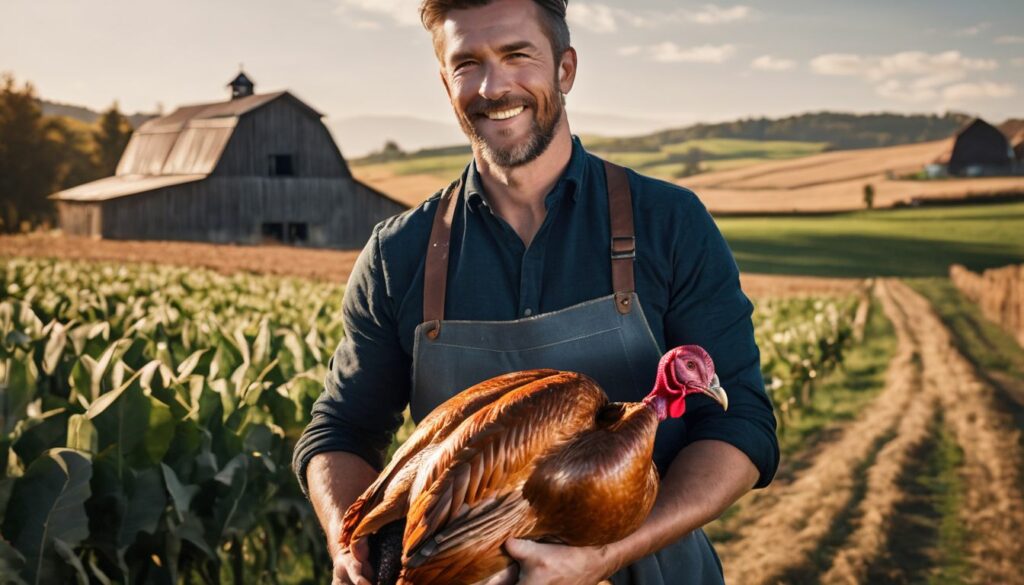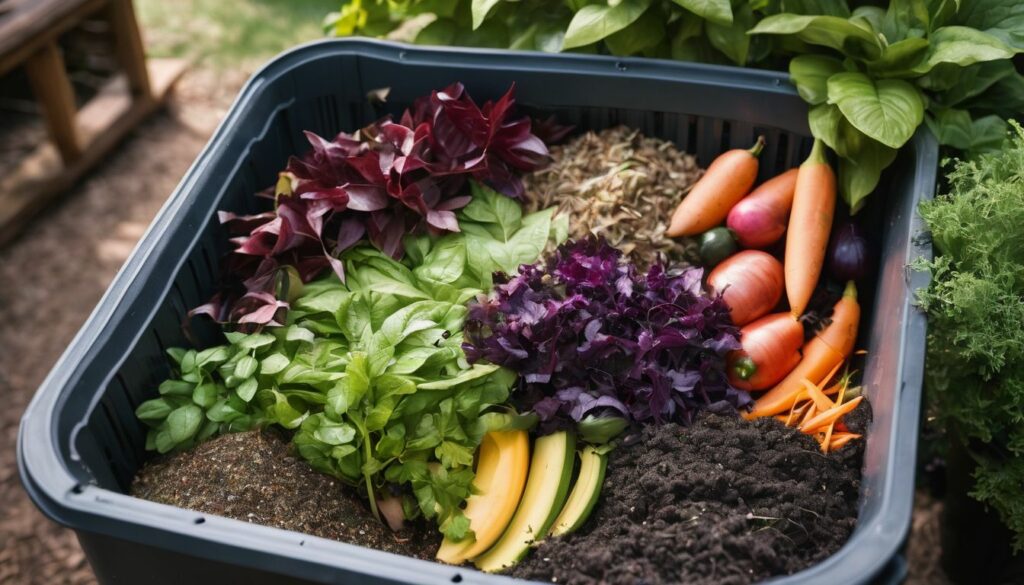Raising your own turkeys for meat can be a daunting task, especially when it comes to deciding which breed will provide the best taste and yield. I’ve been there too, combing through countless turkey varieties trying to find that perfect balance of size, growth rate, and flavor.
And after extensive research (did you know Broad Breasted White is the most common turkey breed raised for food?), I’ve compiled a list of top 9 breeds you should consider for your homestead.
Let’s dive in and explore these robust options together!
Key Takeaways
- The Broad Breasted White is the most common turkey breed raised for food because of its large size and meatiness.
- Different turkey breeds have varying rates of growth, with the Broad Breasted White being known for its fast growth and efficient meat production.
- When choosing a turkey breed for meat, it’s important to consider their feeding and foraging habits, as some breeds are better at finding food on their own than others.
- The top 9 turkey breeds for raising meat on your homestead are: Beltsville Small White, Black Spanish, Bourbon Red, Broad-Breasted White, Bronze, Midget White, Royal Palm, Slate, and White Holland.
What to Consider when Choosing a Turkey Breed for Meat?
When choosing a turkey breed for meat, it is important to consider the size and weight of the birds, their growth rate, as well as their feeding and foraging habits.
Size and weight
Big turkeys give more meat. Some breeds grow larger than others. The Broad Breasted White turkey gets big fast. It is the most common turkey raised for food because it is so big and meaty.
Other breeds like the Midget White and Bourbon Red are smaller, but they taste very good. If you want a lot of meat, pick a bigger breed like the Broad Breasted White or Bronze turkey.
Growth rate
When it comes to choosing a turkey breed for meat, one important factor to consider is the growth rate. Different breeds of turkeys have varying rates of growth, so it’s essential to choose a breed that meets your needs.
The Broad Breasted White breed is particularly known for its fast growth and ability to produce meaty birds quickly. On the other hand, heritage turkey breeds like the Narragansett may not grow as rapidly but offer other qualities such as a calm disposition and unique appearance.
So, if you’re looking for quick and efficient meat production on your homestead, the Broad Breasted White might be the ideal choice.
Key Facts Used:
– The Broad Breasted White breed has a fast growth rate.
Feeding and foraging habits
Turkey breeds vary in their feeding and foraging habits. Some breeds are better at finding food on their own while others may require more supplemental feed. It’s important to consider the natural instincts and abilities of each breed when choosing a turkey for your homestead.
The Midget White and Bourbon Red breeds, known for their excellent taste, have good foraging skills and can find much of their own food. On the other hand, breeds like the Broad Breasted White may rely more heavily on commercial feed due to their fast growth rate.
Understanding the feeding and foraging habits of different turkey breeds can help you make an informed decision about which breed is best suited for your homestead.
Top 9 Turkey Breeds for Raising Meat:
Here are the top 9 turkey breeds for raising meat on your homestead: Beltsville Small White, Black Spanish, Bourbon Red, Broad-Breasted White, Bronze, Midget White, Royal Palm, Slate, and White Holland.
Beltsville Small White
The Beltsville Small White is one of the top turkey breeds for raising meat on your homestead. They are known for their small size and excellent feed conversion, which means they can produce a lot of meat with less feed.
These turkeys have dense muscle growth, resulting in flavorful and tender meat. The Beltsville Small White breed is also docile and easy to handle, making them a popular choice for backyard farmers.
Plus, they have great reproductive abilities, allowing you to raise more turkeys in the future if desired. So if you’re looking for a compact but efficient turkey breed that produces high-quality meat, the Beltsville Small White is an excellent option.
Black Spanish
The Black Spanish turkey breed is one of the heritage breeds that are known for their meat production. They have a beautiful black feather color and are medium-sized turkeys. The Black Spanish turkeys have a calm temperament, making them easy to handle on the homestead.
When it comes to taste, their meat is flavorful and delicious. These turkeys also have good foraging abilities, which means they can find food on their own by exploring the area around them.
If you’re looking for a turkey breed that is both attractive and provides tasty meat, consider raising Black Spanish turkeys on your homestead.
Bourbon Red
Bourbon Red is another popular turkey breed for meat production. It has a beautiful red plumage with white flight feathers. They have a calm temperament, making them easy to handle and raise on the homestead.
The Bourbon Red is known for its flavorful, tender meat that makes it a favorite choice for Thanksgiving dinners. While they may take slightly longer to reach full size compared to other breeds, their tasty and succulent meat makes up for it.
If you’re looking for a heritage breed with excellent taste, the Bourbon Red is definitely worth considering.
Broad-Breasted White
The Broad-Breasted White is the most common turkey breed raised for food. They are known for being fast-growing and producing meaty birds. This breed has a high feed conversion rate, which means they efficiently turn their food into muscle.
The Broad-Breasted White turkeys have broad chests and plump breasts, making them ideal for roasting. Their white feathers give them a clean appearance, and they have a calm disposition, making them easier to handle on the homestead.
Bronze
The Bronze turkey is one of the most popular breeds for meat production. They are known for their large size and quick growth rate, making them a top choice for homesteaders looking to raise turkeys for food.
The Bronze breed has a calm temperament and adapts well to various environments, making them easy to care for on the homestead. When it comes to meat quality, Bronze turkeys are known for their flavorful and tender meat.
Their broad breast and plump body make them ideal for roasting or grilling. If you’re looking for a reliable and tasty turkey breed, consider raising Bronzes on your homestead.
Midget White
The Midget White turkey breed is one of the top choices for meat production on homesteads. They are known for their excellent taste and quality of meat. These turkeys have a compact size, making them easier to handle and manage compared to larger breeds.
Midget Whites also have a good feed conversion rate, which means they efficiently convert food into body weight. They are not as fast-growing as some other breeds, but they make up for it with their delicious flavor.
If you’re looking for a smaller-sized turkey that still provides great meat for your homestead, the Midget White is an excellent option to consider.
Royal Palm
The Royal Palm turkey breed is known for its striking appearance. These turkeys have a white base color with black stripes on their feathers, making them quite unique. They are a medium-sized breed, weighing around 10-16 pounds when fully grown.
In terms of temperament, Royal Palms are known to be docile and friendly, which makes them a good choice for homesteaders who want calm birds. While they may not grow as quickly as some other meat breeds, the Royal Palm still provides flavorful meat that many people enjoy.
So if you’re looking for a visually appealing and easygoing turkey breed for your homestead, the Royal Palm could be a great option to consider.
Slate
The Slate turkey breed is one of the top nine breeds for raising meat on your homestead. They have a beautiful blue-gray color that sets them apart from other turkeys. In terms of temperament, Slates are known to be calm and friendly, making them easier to handle.
When it comes to meat quality, they provide delicious and tender meat that is highly sought after by many farmers. If you’re looking for a unique and flavorful option for your meat production, the Slate turkey breed is definitely worth considering.
White Holland
White Holland turkeys are one of the breeds commonly raised for meat production. They have a white plumage, and their appearance is similar to the wild turkey. White Holland turkeys have a calm temperament, which makes them easier to handle and care for on the homestead.
When it comes to meat quality, they are known for having tender and flavorful meat. These birds can grow quite large, with mature males weighing around 25 pounds or more. So if you’re looking for a breed that produces tasty meat and has a docile nature, White Holland turkeys could be an excellent choice for your homestead.
Characteristics and Qualities of Each Breed
Learn about the unique appearance, temperament, and meat quality of each breed to find the perfect turkey for your homestead. Read more to discover which breed suits your needs!
Appearance
Each turkey breed has its own unique appearance. The Beltsville Small White is a small, plump bird with white feathers and a short black beard. The Black Spanish has glossy black feathers with hints of iridescent green or purple.
The Bourbon Red boasts beautiful red plumage and white wingtips. The Broad-Breasted White is the typical Thanksgiving turkey, known for its large size and all-white feathers. The Bronze breed has dark brown or bronze-colored feathers with hints of iridescent green or purple.
Midget Whites are small turkeys with pure white feathers and a round shape. Royal Palms have striking black and white striped plumage that resembles the pattern on palm leaves. Slate turkeys have blue-gray feathers that can range from light to dark shades, while White Hollands are pure white all over.
Temperament
When choosing a turkey breed for meat, it’s important to consider their temperament. Some breeds are known for being calm and docile, which can make them easier to handle and raise in a homestead setting.
For example, the Narragansett breed has a calm disposition, making them suitable for families or individuals who want a more gentle turkey. On the other hand, some breeds may be more active and energetic, requiring more space and exercise.
It’s essential to take into account your own preferences and needs when selecting a turkey breed based on temperament.
Meat quality
When it comes to choosing a turkey breed for meat, the quality of the meat is an important factor to consider. The taste and texture of the meat can vary depending on the breed. According to poultry expert Janet Garman, two breeds that are known for their excellent meat quality are the Midget White and Bourbon Red breeds.
These breeds are specifically bred for their delicious flavor and tender meat. While there are other turkey breeds that may grow faster or have different qualities, if you’re looking for top-notch meat quality, you can’t go wrong with these two breeds.
How to Care for and Raise Meat Turkeys
To care for and raise meat turkeys, provide them with proper housing and bedding, ensure they have access to quality feed and nutrition, monitor their health regularly, and learn the proper techniques for butchering and processing.
Housing and bedding requirements
Meat turkeys need a safe and comfortable place to live on your homestead. They require a secure, well-ventilated housing with enough space for them to move around. The turkey coop should protect them from predators and have easy access to food and water.
Bedding material such as straw or wood shavings should be provided on the coop floor to keep them clean and dry. It’s important to regularly clean their bedding to maintain good hygiene and prevent diseases.
Feeding and nutrition
Feeding and nutrition are important considerations when raising meat turkeys on your homestead. These birds have specific dietary needs to ensure they grow healthy and produce high-quality meat.
Providing a balanced diet is crucial, including a mix of commercial turkey feed, grains, vegetables, and insects for the turkeys to forage. It’s also important to offer clean water at all times.
By meeting their nutritional requirements, you can help them reach their maximum growth potential and produce delicious meat for your table.
Health concerns
Taking care of the health of your meat turkeys is essential for a successful homestead. One common health concern in turkey farming is parasites, such as mites and lice, which can cause discomfort and lead to unproductive birds.
Regular monitoring and treatment with approved insecticides or natural remedies are important to keep these pests at bay. Another issue to watch out for is respiratory diseases, which can be spread through contaminated air or water sources.
Good ventilation and hygiene practices, along with proper biosecurity measures, can help prevent the spread of diseases among your flock. Lastly, maintaining a balanced diet that meets their nutritional needs will contribute to their overall well-being and productivity.
Providing access to clean water, high-quality feed specially formulated for turkeys, and necessary supplements will help ensure that your meat turkeys stay healthy and thrive on your homestead.
Butchering and processing
When it comes to butchering and processing your meat turkeys, there are a few important things to keep in mind. First, you’ll want to make sure you have the right equipment and tools on hand, such as sharp knives, a clean workspace, and containers for storing the meat.
It’s also important to follow safe handling practices to prevent any contamination or foodborne illnesses.
Once you’re ready to start butchering, you can begin by removing the feathers from the turkey. This can be done by either plucking them out manually or using a mechanical plucker if you have access to one.
After that, you can remove the head and feet of the turkey.
Next, it’s time to carefully remove the internal organs of the bird. This includes taking out the crop, gizzard, heart, liver, and lungs. You can save these organs if desired for cooking or discard them accordingly.
Conclusion
In conclusion, when it comes to choosing the best turkey breed for meat on your homestead, there are several options to consider. The Midget White and Bourbon Red breeds are known for their tasty meat, while other breeds may have different qualities.
Whether you prefer fast-growing birds or specific characteristics like size and temperament, there is a turkey breed suitable for every homesteader’s needs.
FAQs
1. What are some of the best turkey breeds for meat?
The Blue Slate, Beltsville Small Whites, Standard Bronze, BroadBreasted White and the Orlopp Bronze are among the top turkey breeds for meat.
2. Can I raise turkeys on my homestead?
Sure! Breeds like BroadBreasted White and Orlopp Bronze are perfect for homesteads. They can grow big with enough feed.
3. How do I pick the right turkey breed for me?
Know what you want from your turkeys first. Some have good tasting quality of meat; others grow large faster due to their feeding habits.
4.How does a heritage turkey breed differ from a production one?
Heritage turkeys like Narragansett tend to be calmer in disposition and can find food on their own better than production ones.
5. Are there any small-sized turkey breeds that provide good meat?
Yes, Beltsville Small Whites is one such small yet tasty meat breed suited well even for small-scale farming or homesteading needs.





